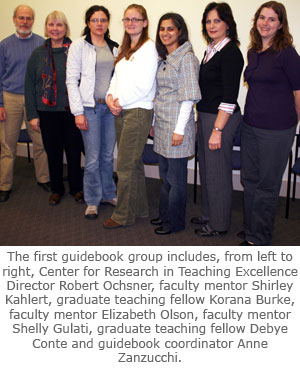

Teams of UC Merced graduate students will develop innovative curriculum that addresses the needs of undergraduates, especially first-generation college students.
With the help of a $295,484 grant from the U.S. Department of Education Fund for the Improvement of Post-Secondary Education (FIPSE), the
Center for Research on Teaching Excellenceis launching a two-year
programthat will explore solutions to problems often confronted by students who are the first ones in their immediate family to attend a university. More than half of UC Merced’s undergraduate students are first-generation college students. It’s also a demographic growing exponentially at other research university campuses.
“There are so many creative ideas and useful instructional techniques graduate student instructors and faculty members have developed in response to our students’ needs,” said Anne Zanzucchi, the Center’s guidebook and assessment coordinator. “The program is an effective way to capture and publish a lot of interesting teaching techniques that otherwise might be ephemeral.”
“UC Merced’s Graduate Student Instructor Guidebook: Creating an Academic Community for First-Generation College Students” will be used across academic disciplines for instructors in all three of UC Merced’s schools, and eventually by other UC campuses. The first team of
graduate studentsincludes historian Elana Gainor, physicist Korana Burke and biologist Debye Conte. The overall goal of the project is to strengthen the college students’ ability to collaborate within the academic community. Graduate student participants will also gain advanced teaching and assessment experience relevant to future faculty roles.
UC Merced was among the 40 Hispanic-Serving Institutions that received a FIPSE grant in the fall. The award underscores the university’s call to unite scholars from different backgrounds to help the Central Valley’s underserved population thrive in higher education.
Each semester, three graduate students and two faculty mentors will pick a topic to research and publish the results through the University of California’s
eScholarship Web site. The written component will include a hypothesis, classroom activities and a conclusion with evidence showing the techniques are effective. There also may be multimedia components, such as videos.
Conte, the graduate student in biology working on the guidebook this semester, recalled the daunting feeling when she became a teacher’s assistant because she never imagined herself leading a class. After the first day, she realized she loved being able to work with students, who came to school charged up to make a difference in the world.
As a first-generation college student herself, Conte knows all the challenges involved with obtaining a degree, ranging from navigating student services to using the library.
“We make a lot of assumptions on what they should know,” Conte noted. “It was very overwhelming just to walk on campus - the magnitude and size.”
A seminal study several years ago showed first-generation college students are least-likely to earn a degree. Subsequent articles have looked at what factors influence that outcome. The first group of graduate students in the guidebook project will also produce an annotated bibliography of articles about the learning needs of first-generation college students that will be available for the public.
The first group will research classroom activities that help students assess their critical thinking skills and encourage them to collaborate effectively. Other potential topics for future semesters include lessons on writing assessment, time management and group work. The program will involve 18 graduate students and 10 faculty members during its two years of funding. The long-term goal, Zanzucchi said, is to make this an ongoing program so future teaching techniques can be shared, not forgotten.






